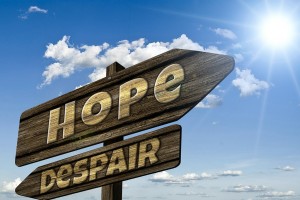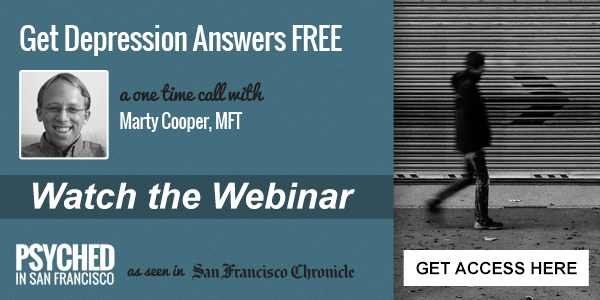Depression and Faith
I surely would have been dead from depression years ago if I hadn’t had, and eventually cultivated, a basic faith in life. Which is a bit odd, since I grew up without any religious training or interest, to the degree that my mother called us “happy heathens.” Even my decades of Buddhist training and study as an adult have been diligently a-religious, mostly technical, practical and pragmatic. So I’ve wondered how it is that I have such a dogged faith in life, when I’ve also had such a longstanding history of depression stretching back to my childhood.

To some degree I can credit my family, a gaggle of mostly-agnostics, or vague Protestants, who nonetheless somehow carried through a sense that life was not completely awful and hideous. But they hadn’t done an exhaustive study of life to arrive at that; there were pockets of shadow and darkness which they didn’t know about, or had walled off from our collective family psyche, and those were the pockets I fell into as a pre-teen. I remember being scared of nuclear war, wrestling with the fact of violence in the world, and long periods of sadness. Despite a relatively stable middle-class upbringing, with its gift of resources, college and career, still a sense of futility chased me, often catching me.
Through my 20’s and early 30’s, there were certainly experiences that were not simply depression, yet depression was where, after periods of growth or relationship or success, my body and mind kept returning. But despite that frustrating cycling of openness and progress collapsing eventually into more depression, still a mule-like sense of faith continued throughout. Initially implicit and mysterious, I learned to cultivate it, to take conscious ownership for the unconscious faith that was likely inherited from family, and through practice, magnify and stabilize it.
What I’ve learned in both my own and my clinical work with depression is that the active strategies and chemical supports are all essential, but without a practice with faith, with the basic existential question of the worth of life itself, depression keeps recurring. With depression, faith is not an optional “add on” to the real treatment of behavioral or pharmacological treatment; it is actually the core of treatment that makes the difference between misery and death, and actual healing and resolution.
What is the relationship between faith and depression?
Faith is the choice to project goodness and possibility into the unknown. Faith is not essentially a dogma, though it can be wrapped in dogma. It’s also not essentially the outcome of algorithm or analytic system. You can’t prove faith.
Depression, in contrast, is the carrier of something of an anti-faith. Depression’s “faith” is in the essential futility of life (of desire, wanting, striving, growing, achieving, relating). Regardless of data, depression’s anti-faith has the power to trump the observable evidence. Though our partner may love us, our workmates value us, our spiritual practice deepen us, still depression can undermine it and render all that meaningless with its assertion of the axiomatic futility of Life.
Thus, a big part of why depressives relapse so often, is that this anti-faith of depression goes unexplored and unchallenged. This is especially true in an individual’s early experiences of recovering from depression, where the emphasis will (generally) be on control and “doing stuff.” We ditch that “depressing job” and find a new career, and that seems to do the trick. Or we realize that it’s actually the town we’re living in that’s so depressing, so we move into the city and, voila, depression lifts. Or we change religions. Or we start a new medication. Or we ditch our boyfriend. Like that, we focus on figuring out how to control depression through “doing stuff.”
This strategy does work for a while, and the aspects of which (action, choice, change, clarifying desires) actually are important components in healing depression (why cognitive-behavioral therapies are so useful as part of a depressive’s treatment). But they don’t get at the basic “faithlessness” of depression, and because they don’t, when we inevitably hit up against another frustration or futile pursuit, another instance where we are not able to control or have power over, then we can collapse into the hole of faithlessness and end up in the dark and scary pit…again.
So, action is necessary in healing depression, but it’s not sufficient. We have to actually wrestle with the question and experience of faith in life itself. Because what we are not doing consciously, depression will do unconsciously.,If we are not creating our sense of meaning in Life actively, then depression will fill that void of meaning for us.
The Development of Faith
So, again, faith is a choice, and not the outcome of a proof, or the outgrowth of a dogma. It is a stance in relation to the unknowns and unknowables of life, which is made robust by the ownership of it as such. The philosopher Ken Wilber has said that in all the research on reincarnation, there is no clear and credible evidence to clearly prove that reincarnation exists. Yet he chooses to believe in it, and at the same time would not claim, nor need, his belief to be objectively true. It’s an aspect of his faith in Life which is consciously being chosen and owned.
“Proof” is one of the powers of depression, and doubt is one of its great enemies. I’ve heard depressed people point to literature on brain science to claim, “We’re all just masses of chemical processes, and it just makes everything pointless!” (i.e., futile, the central experience of depression). It’s as if, given this reading of the data, clearly the only logical outcome is that “Life is futile.” When I point out that those chemicals are a system that is built to transmit information, and that information is shared among different nervous systems, and it itself is the coherent jiggling of energy, and that energy cannot be clearly defined even by experts, and that we’re therefore living embodiments of systems of incredible complexity and mystery—well, if the depression is light I can stimulate some awe and therapeutic doubt. If the depression is heavy, then my client rolls their eyes and just look pitying on their therapist, who clearly doesn’t understand what Life is.
To develop faith we have to both challenge this “myth of the given” (to use Wilber’s term), the idea of the “obviousness” of belief, as well as ownership of a conscious relationship to faith.
Depression really likes the concrete beliefs, and the simple anti-faiths: “I’m worthless. Life is worthless. Nothing is meaningful. Everything is shit.” It likes them because it serves depression’s purpose. What’s depression’s purpose? To keep us away from a life (or pursuit, or idea, or desire) which depression has assessed as “futile”. Depression doesn’t care about data, or what can be objectively proved or not. Depression arises to take control when we are not recognizing what’s futile (according to depression) in our life, and it doesn’t care if it has to lie to us, as long as it can stop us from reaching out for what it deems to be pointless. (There’s much to say about the function of depression, but this is a pretty good sketch for my current focus on faith.)
Depression will be blunt and concrete about its assertions, and will try to deny complexity or skepticism in thinking. “Why exactly is life totally pointless, Depression?” you might ask. And the answer will be, “Well, because it just obviously is.” Though it will pretend towards claims that are “just true”, depression is really just based in this anti-faith, which cannot be proved any more than faith in goodness. Again, depression is a stance, not a proof.
Faith as Cure
As with so much about the healing of depression, the cure is in the antithesis. We have to study depression and its anti-faith, in order to develop the realization that its claims to reality are only that, claims, which then opens up space to consciously take a different stance.
This is where the practice of conscious faith both gets traction, and also, in practice, challenges depression’s claims. Practicing conscious faith is just that: choosing to look at the unknowns of life and project and imagine them filled with possibility, abundance, and goodness. “Why do terrible things happen to good people? I actually don’t know. I feel sadness, and empathy, and vulnerability. And I can’t claim to know why it happens, and can’t claim to say that it shouldn’t. But I do choose to assume goodness and possibility in the face of this frightening unknown. I can see how often humans do treat each other well, and don’t hurt each other. But that only supports my faith, it doesn’t define it. I choose to believe in goodness because there’s no proof either way, but when I have faith in life, then my life is better and I treat others with more kindness and gratitude.”
You may have to do that in writing, and art, and with friends, and in prayer, in meditation, a dozen times a day, especially when depressed, in order to dislodge and displace the anti-faith of depression. It doesn’t mean that you are ignoring or being Pollyanna about the harshness and painfulness of life (to try that route of intentional cluelessness will simply give depression proof that you don’t know what you’re talking about), but rather that you are empowering yourself to radically determine your stance towards life, knowing the risks and unknowns, not falling for the “obviousness of goodness” dogma, but taking a radical responsibility for your experience of Life, and your definition of meaning.
This is hugely anti-depressive because, again, if we are not taking responsibility consciously for the meaning of our life, depression will do so unconsciously. Life doesn’t have a predetermined meaning, so if we are not owning our faith in its goodness, depression will take over the role of meaning-maker. If someone has to take responsibility for our stance towards life, it had better be us.
You might think this is discussion is an abstraction, a philosophical dalliance when set against the need to “do something about depression”. While that “doing”, as I said above, is very important, it is actually only the support to the question of faith, not the primary treatment itself. If Life keeps being seen through the anti-faith of depression, as futile and meaningless, then we will have a life full of recurring depression, because living itself will be the source of depression. But if we make the question and inquiry and cultivation of faith central, then we actually will be getting at the core of depression, and thereby actually have a chance to arrive at a fundamental resolution.

